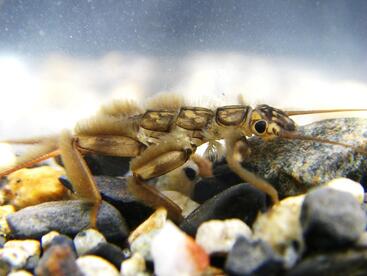UCR ecologist Kurt Anderson and collaborators have received a $500,000 grant from the National Science Foundation to track the effects of environmental changes on creatures that live in freshwater streams.
Anderson, an associate professor in UCR’s Department of Evolution, Ecology, and Organismal Biology, will lead a team of researchers and graduate students in the eastern U.S. and São Paulo, Brazil, conducting simultaneous field projects.
Anderson will be part of a multidisciplinary research team from UCR, Virginia Tech University, and the University of Maryland - Baltimore County in the U.S. and Universidade Federal de São Carlos and São Paulo State University in Brazil.
Their collective goal is understanding how stream insects and arthropods are responding to climate changes including temperature and precipitation, and whether those responses depend on where in the stream the insects live.
“These aquatic creatures are like canaries in coal mines. They’re sentinel species, very sensitive to changes in the environment,” Anderson said. “They’re used throughout the world as biological indicators of water quality and the health of rivers.”
Beginning in 2023, UCR’s team will begin working with partners to sample insects in the temperate, forested mountain streams of Virginia, while the Brazilian team begins its research in the Atlantic rain forest outside São Paulo.
Both teams will be looking at the impact of weather, the intensity of stream flows, and other markers on insects such as mayflies, stoneflies, and caddis flies.
“Most of these types of insects, people haven’t heard of unless they like to go fishing,” Anderson said. “They live most of their lives in streams and emerge when they’re ready to reproduce. But they play very important roles in the environment.”
UCR researchers will provide both teams with expertise on forecasting how the insects might respond as climate change effects get stronger.
The three-year project is supported by funds from a new National Science Foundation program called Biodiversity on a Changing Planet. This is the first year the program has awarded research grants, which are designed to increase global awareness of climate change effects on ecosystems and animal life that provide services to humans.
The Brazilian researchers were funded by a partnering grant from the São Paulo Research Foundation.
